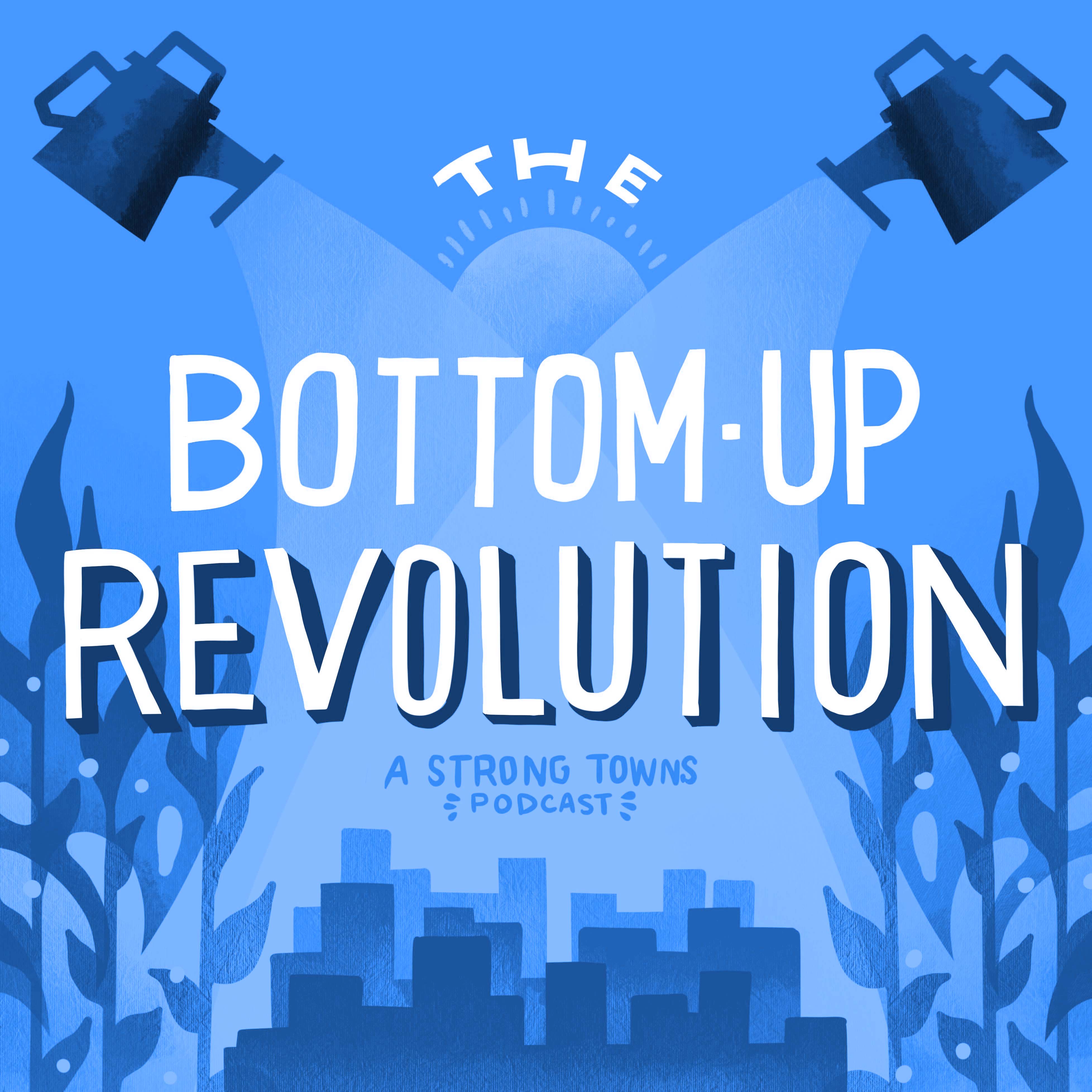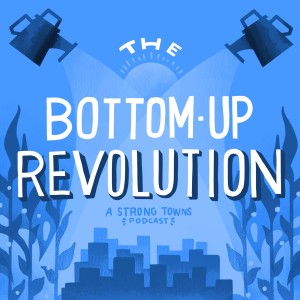
562K
Downloads
301
Episodes
The Bottom-Up Revolution features the stories of the Strong Towns movement in action. Hosted by Tiffany Owens Reed and Norm Van Eeden Petersman, it's all about how regular people have stepped up to make their communities more economically resilient, and how others can implement these ideas in their own places. We’ll talk about taking concrete action steps, connecting with fellow advocates to build power, and surviving the bumps along the way—all in the pursuit of creating stronger towns. Each episode features a Strong Towns advocate who is making positive change in their community.
Episodes

Thursday Aug 29, 2024
The Bottom-Up Revolution Is…Making a Difference With Local Government
Thursday Aug 29, 2024
Thursday Aug 29, 2024
Alec Davis is a native of Des Moines, Iowa, with a background in engineering and consulting. In 2018 he left the corporate world to venture out as an entrepreneur, starting a restaurant alongside his brother back home in Des Moines. In 2023, after learning more about zoning and advocacy, he started Momentum Des Moines, an urban advocacy organization.
On this episode of The Bottom-Up Revolution, Davis joins host Tiffany Owens Reed to talk about Momentum Des Moines’ efforts to build a better city by working with local government to end car dependency and make the city more accessible for everyone.
ADDITIONAL SHOW NOTES
-
Local recommendations:
-
Do you know someone who would make for a great Bottom-Up Revolution guest? Let us know here!
-
Subscribe to The Bottom-Up Revolution on iTunes, Google Podcasts, Podbean or via RSS.

Thursday Aug 22, 2024
The Bottom-Up Revolution Is…Helping Incremental Developers Make Better Places
Thursday Aug 22, 2024
Thursday Aug 22, 2024
Jennifer Krouse is a real estate strategist and the CEO of Liberty House Plans, an architectural publishing house that provides architectural plans for neighborhood-friendly buildings. Previously, she served as a business advisor to real estate developers and a consultant in the field of municipal productivity. She is a member of the National Town Builders Association and holds a BA from Williams College and an MBA from the Stockholm School of Economics.
On this episode of The Bottom-Up Revolution, Krouse joins host Tiffany Owens Reed to talk about the ways Liberty House Plans makes incremental development easier and less risky. They also discuss the art of placecraft — also known as placemaking — and the importance of places being productive.
ADDITIONAL SHOW NOTES
-
Do you know someone who would make for a great Bottom-Up Revolution guest? Let us know here!

Thursday Aug 15, 2024
Thursday Aug 15, 2024
Seth Zeren is a a neighborhood developer and founding member of Strong Towns, as well as a self-proclaimed recovering city planner and a writer at the Build the Next Right Thing Substack. A San Francisco native, Zeren now lives with his family in Providence, Rhode Island, where he works as an incremental developer.
Zeren returns in this episode of The Bottom-Up Revolution to talk with host Tiffany Owens Reed about the political side of incremental development and how to deal with issues like balancing needed development with the increased property taxes that development usually brings.
ADDITIONAL SHOW NOTES
-
Do you know someone who would make for a great The Bottom-Up Revolution guest? Let us know here!

Thursday Aug 08, 2024
The Bottom-Up Revolution Is…Advocating for Better Transit and Safe Streets
Thursday Aug 08, 2024
Thursday Aug 08, 2024
Erik Lowe is the founder of Reimagine Spokane, a grassroots group of citizens who are calling for safer streets and better transit in Spokane, Washington. He's also the designer of the “Spokane Reimagined” plan, a $1 billion proposal to improve safety and connectivity in Spokane over 20 years. On this episode of The Bottom-Up Revolution, he joins host Tiffany Owens Reed to talk about transit advocacy and the importance of walkability and safe streets.
ADDITIONAL SHOW NOTES
-
Local recommendations:
-
Riverfront park, food truck, falls, gondola.
-
-
Do you know someone who would make for a great The Bottom-Up Revolution guest? Let us know here!

Thursday Jul 25, 2024
Thursday Jul 25, 2024
Seth Zeren is a a neighborhood developer and founding member of Strong Towns, as well as a self-proclaimed recovering city planner and a writer at the Build the Next Right Thing Substack. A San Francisco native, Zeren now lives with his family in Providence, Rhode Island, where he works as an incremental developer.
On this episode of The Bottom-Up Revolution, Zeren joins host Tiffany Owens Reed to talk about his path to becoming an incremental developer with a midsize real estate firm, the stark divide between most modern developers and non-developers, and his approach to both incremental finance and philosophy.
ADDITIONAL SHOW NOTES
-
Do you know someone who would make for a great The Bottom-Up Revolution guest? Let us know here!

Thursday Jul 18, 2024
The Bottom-Up Revolution Is…Becoming a Member of Local Government
Thursday Jul 18, 2024
Thursday Jul 18, 2024
Erin Joyce is the mayor of Braintree, Massachusetts. She’s also a professional civil engineer, former chair of her local planning board, former PTO president, youth soccer coach, and mom to three boys.
She’s joining host Tiffany Owens Reed today on The Bottom-Up Revolution to discuss what it’s like to build strong towns as an elected official, the challenges and opportunities she’s faced, and the importance of community engagement in local government.
ADDITIONAL SHOW NOTES
- Erin Joyce (site).
-
Local recommendations:
-
Widowmaker Brewery in the Blue Hills.
-
-
Do you know someone who would make for a great Bottom-Up Revolution guest? Let us know here!

Thursday Jul 11, 2024
The Bottom-Up Revolution Is…City Building With Small-Scale Manufacturers
Thursday Jul 11, 2024
Thursday Jul 11, 2024
Ilana Preuss is the founder and CEO of Recast City, a program that helps cities build strong downtowns by empowering small-scale manufacturers. She is also the author of “Recast Your City: How to Save Your Downtown with Small-Scale Manufacturing.” Previously, she was the vice president and chief of staff at Smart Growth America and led the technical assistance program at the EPA Smart Growth Program. She is a TEDx speaker on, “The Economic Power of Great Places,” and a featured keynote speaker.
In this episode of The Bottom-Up Revolution, Preuss joins host Tiffany Owens Reed to discuss the importance of small-scale manufacturing and her experiences as a city builder.
ADDITIONAL SHOW NOTES
- Local recommendations:
-
Do you know someone who would make for a great Bottom-Up Revolution guest? Let us know here!

Thursday Jun 27, 2024
The Bottom-Up Revolution Is…Fighting for Better Public Transit in the Big Apple
Thursday Jun 27, 2024
Thursday Jun 27, 2024
Danny Pearlstein is the policy and communications director at Riders Alliance, a nonprofit transit advocacy organization in New York City. With degrees in environmental studies and urban planning from Cornell, a degree in law from Cardozo and a history on the New York City Council, Pearlstein works to ensure every New Yorker has access to frequent, reliable, accessible and affordable public transit. Today, he joins host Tiffany Owens Reed to discuss congestion pricing, car dependency and public transit in the Big Apple.
ADDITIONAL SHOW NOTES
-
Do you know someone who would make for a great Bottom-Up Revolution guest? Let us know here!

Thursday Jun 13, 2024
The Bottom-Up Revolution Is…Helping Local Advocates Improve Their Cities
Thursday Jun 13, 2024
Thursday Jun 13, 2024
In this special episode for Member Week, Tiffany interviews Strong Towns Community Builder John Pattison. Pattison works with advocates in hundreds of communities as they start and lead local Strong Towns groups called Local Conversations. In the interview, they explore how these groups embody the bottom-up nature of the Strong Towns movement, some of the ways Local Conversations have successfully improved their cities, and how becoming a member supports the Local Conversations program.
In addition to his work with Strong Towns, Pattison is the author of two books, most recently “Slow Church” (InterVarsity Press), which takes inspiration from Slow Food and the other Slow movements to help faith communities reimagine how they live life together in the neighborhood. He and his family live in Silverton, Oregon.
ADDITIONAL SHOW NOTES
- Become a member today!
- Tiffany Owens Reed (Instagram).
-
Do you know someone who would make for a great Bottom-Up Revolution guest? Let us know here!

Thursday May 23, 2024
The Bottom-Up Revolution Is…Unexpected Allies Fighting a Highway Expansion Project
Thursday May 23, 2024
Thursday May 23, 2024
In this special edition of The Bottom-Up Revolution, recorded last week at the 2024 National Gathering, we have a double interview with Susan Graham and Ally Smither. Graham and Smither are part of a movement in Houston, Texas, called Stop TxDOT I-45, which is working to prevent a massive highway expansion.
Susan is a retired nurse who has lived in Houston for decades and who started the movement after hearing about the Texas Department of Transportation’s plans for her neighborhood. Ally is originally from London, Ontario, in Canada. A professional opera singer, she stumbled upon the world of transportation advocacy during COVID-19, as well as finding a new professional path in communications, community advocacy and (most recently) as chief of staff for Texas Senator-Elect Molly Cook.
ADDITIONAL SHOW NOTES
-
Do you know someone who would make for a great Bottom-Up Revolution guest? Let us know here!
